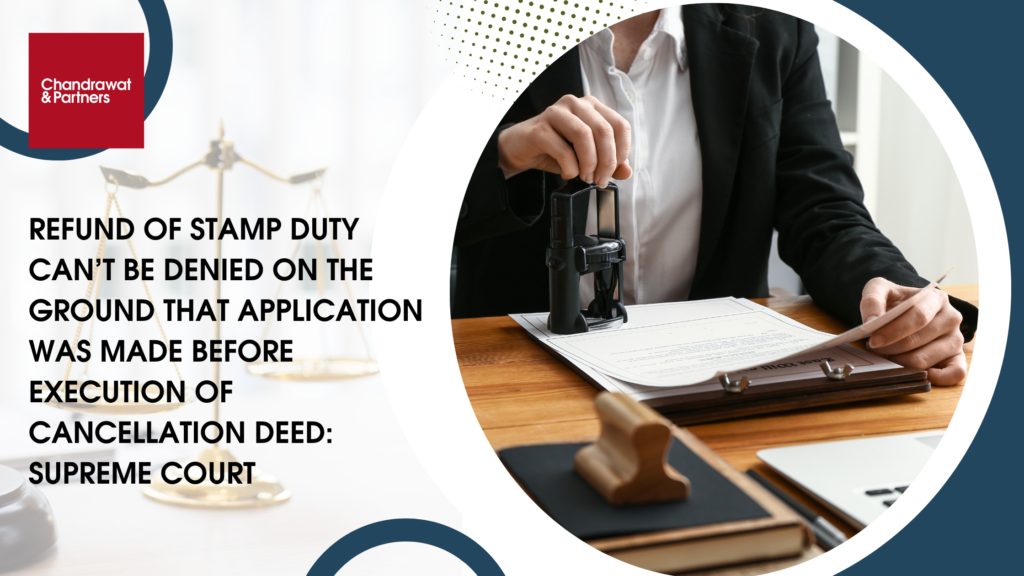
Share :
BACKGROUND
The judgment by a two-Judge Bench of the Hon’ble Supreme Court in the case of Bano Saiyed Parwaz v. Chief Controlling Revenue Authority & Ors. comprising of Justice B.R. Gavai and Justice Prashant Kumar Mishra revolves around a dispute concerning refund of stamp duty in instances of fraudulent transactions. This was a civil appeal against a decision of the Bombay High Court which highlights the court’s commitment of upholding justice and equity in situations where citizens fall victim to deceit. The court held that the refund sought by the appellant was dismissed because of the expiration of the statutory time period.
FACTS
The appellant purchased a property from the vendor, after which a deed of conveyance was prepared for the same. Further the deed was sent to the respondent for adjudication on 07-05-2014 for the payment of stamp duty that was assessed at Rs. 25,24,350. As a result, on 03-05-2014, the appellant paid the amount and purchased stamp duty for the registration of the conveyance deed. The deed was not registered since the vendor had previously sold the property to a third party in 1992. On knowing this the appellant decided to cancel the transaction, but was unable to contact the vendor, compelling him to file a complaint with the police. This resulted in the cancellation of the executed deed. However, on 22-10-2014, the appellant applied online for a refund of stamp duty. Respondents rejected the appellant’s demand for a refund on the ground that it was filed after the limitation time stipulated by Section 48 of the Maharashtra Stamp Act, 1958 (the “Act”).
KEY ISSUE INVOLVED
Whether the application for refund of stamp duty for registration of conveyance deed was maintainable as the application was filed beyond the limitation period as prescribed under Section 48 of the Act.
JUDGMENT
The Supreme court observed that the appellant was bona fide purchaser of the property and the course of action taken by the appellant was in the accordance with the remedies of the law. Thus, she was not negligent in seeking refund of the stamp duty and was denied solely on the ground of limitation. Further the court explained that under Section 47 of the Act, submitting the application within the stipulated time of six months and subsequent enquiry are altogether separate processes and the appellant in the present case has complied with the said provision. Thus, the High Court’s finding was found to be contrary to the said provision by the apex court.
The court held that the appellant was entitled to a refund of stamp duty as it was paid by her in good faith for registration of the property and got deceived by the vendor which resulted in the cancellation of the conveyance deed.
Therefore, the appeal was allowed by the apex court by directing the state to refund the stamp duty amounting Rs. 25,34,400 to the appellant and setting aside the order of the High Court and other Revenue Authorities.
PRECEDENTS REFERRED
The judgment of the Supreme Court in this case draws inference from the decision of the court in Committee-GFIL v. Libra Buildtech Private Limited & Ors. The issue in the case before the court was regarding refund of stamp duty and it was held that even if we find that applications for refund of stamp duty were appropriately dismissed by the SDM on the grounds of limitation prescribed under Section 50 of the Act, keeping in mind the settled principle of law that the expiry of a period of limitation prescribed under any law may bar the remedy but not the right, the applicants are still entitled to claim the refund of stamp duty amount. In other words, even if the applications are dismissed due to limitation period, the applicants are entitled to a refund of the stamp duty from the State based on the aforementioned grounds.
ANALYSIS
The Supreme Court’s ruling underlines that laws must be interpreted and applied in ways that promote justice, equality and fairness. This case establishes a precedent for ensuring that procedural barriers do not act as impediment for the victims of fraud. The court also highlighted the need of the state to act as an honest and accountable body while dealing with its citizens as it is a significant step towards enhancing accountability and responsiveness of the government. As a result, the court stated that the legal position is decided and emphasised that when dealing with a citizen, the state should not normally depend on technicalities. Thus, the court opined that the appellant’s case was eligible for refund of stamp duty because it is a well-established principle of law that expiration of a limitation period provided by any law may preclude the remedy but not the right.
For more information or queries, please email us at
enquiries@chandrawatpartners.com



